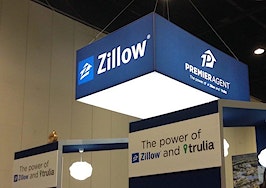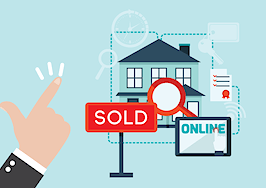Platforms like Opendoor and OfferPad could drive Americans to move more frequently, resulting in more home sales, according to a report from investment banking firm Evercore ISI.
Such companies, which the report terms “iBuyers,” use new technology to make quick offers on homes and close in days. They could also chip into real estate commissions and help homebuilders move their inventory faster, the authors wrote.
The report underscores growing enthusiasm for iBuyers on Wall Street. Institutional investors are funding iBuyers or setting up their own, and their interest in the business model helps explain why Zillow Group created Zillow Instant Offers, which is essentially a marketplace for iBuyers.
“We believe that investors should familiarize themselves with this new business model, as these iBuyers are likely to garner increased attention over the next few years,” the report said.
“If successful, these iBuyers could improve liquidity in the housing market by reducing friction costs, and drive increased housing turnover (existing home sales).”
That would have “important implications for Realtors, remodeling demand, and even homebuilders,” the report said.
Online brokerages have sputtered because consumers want on-the-ground, experienced agents, the report says. But given the typical length and costs associated with home sales, “it seems data-driven technology innovators will drive some of this inefficiency out of the home-buying process.”
Enter iBuyers. They are “home resale innovators” that:
- send quick “tentative bids” on request
- conduct an inspection and provide “binding, all-cash offers” within a few days
- close at a seller’s convenience, anywhere from two to 60 days
- charge a service fee that ranges from 6 to 13 percent.
IBuyers “provide convenience, speed and certainty to the seller, and charge a fee that is often equal to or less than what the seller would incur through a traditional sales process.”
That assessment is based partly on the report’s conclusion that offers from iBuyers represent a home’s value, minus a discount “for repairs and ‘punch-list’ items that the homeowner would normally be required to fix before listing on the MLS anyway.” Skeptics argue that homeowners who sell to iBuyers often accept a more significant discount.
“Unlike a typical investor who submits ‘lowball’ bids in an attempt to buy an asset below market, iBuyers strive to have their home bids be as accurate as possible, and generate profit from the service fee they charge,” the authors say.

Opendoor’s average service fee is 7.5 percent while Offerpad’s ranges between 8 to 9 percent, according to the report.
Convenience, predictability and the ability to synchronize the sale of an old home with the purchase of a new one justify these fees, according the report.
The typical Opendoor seller prefers to close in 32 days, compared to an average home sale process of 80 to 100 days. This two month gap represents “a substantial cost burden for the seller” — two months of property taxes, mortgage payment and maintenance.
“In essence, therefore, the iBuyer’s fee can be thought of as replacing a number of costs that the homeseller would otherwise need to incur,” the report contends.
When factoring in two months of carrying costs, iBuyer fees are “fairly competitive with the traditional sales route” and will only grow more competitive as they improve pricing accuracy and lower fees.
IBuyers are off to a promising start, with homeowners who request offers accepting them between 20 and 30 percent of the time, the report found.
Opendoor already accounts for nearly 2 percent of Phoenix’s existing home sales and its progress in Dallas shows it can scale rapidly, according to the report.
IBuyers will expand quickly and their “near-term addressable market” accounts for half of U.S. home sales, with that share likely to grow over time, the report said.
This could boost mobility and total home sales.
“Similar to how Home Depot expanded the market for home improvement by making it easier for homeowners to tackle DIY projects, iBuyers could increase home sales by making it easier and less costly to sell homes,” the report said.
“This would essentially make housing a more liquid asset class, and lead homeowners to move more frequently.”
If iBuyers had 10 percent of the market and led the average homeowner to move once more than they do now, iBuyers would boost existing home sales by 40 percent, according to the report.

The report casts iBuyers as an attractive alternative to real estate agents — both from a cost and convenience perspective. But the authors believe iBuyers will only have a “modestly negative impact on brokerage commissions on the listing side.”
However, they also raised the possibility that iBuyers could use technology, marketing and discounts to sell more homes to unrepresented buyers, which would put downward pressure on buy-side commissions as well.
The report pointed towards Opendoor’s trade-in program under which homeowners “who sell to Opendoor can buy a home from Opendoor and receive a discount of up to 3 percent — in essence, pocketing the typical buyer’s agent commission.”
Commission compression would be somewhat offset by the increased home sales that iBuyers would generate, and many “difficult-to-price homes will still rely on the traditional brokerage model.”
Homebuilders stand to benefit from the iBuyer trend, the report said.
By partnering with iBuyers, they could synchronize transactions so that buyers can sell their old homes to iBuyers and purchase new ones from homebuilders at the same time.

Note: “$300mm” should be “$320mm” and “homes sold” should be “homes bought and sold.”
Opendoor is piloting such a program with Lennar in Las Vegas. The report found it was “working well and driving increased sales.”
Under future partnerships, iBuyers could market opportunities for a homeowner living in a home purchased from a builder to trade up for another home constructed by the same builder.
“These directly sourced leads would bypass the 2.5-3.0 percent co-broker commission that the builder pays to Realtors who escort their clients to its sales center — a major cost and source of frustration for homebuilders,” the report said.
The remodeling industry also may feel the impact of iBuyers.
By increasing mobility, iBuyers could shift remodeling demand away from structural remodeling projects towards more “decorative” projects, the report said.
That’s because the challenge of moving drives structural projects — undertaken with the expectation of remaining in a home for a long time. But homeowners often spruce up their properties with decorative projects to sell.






